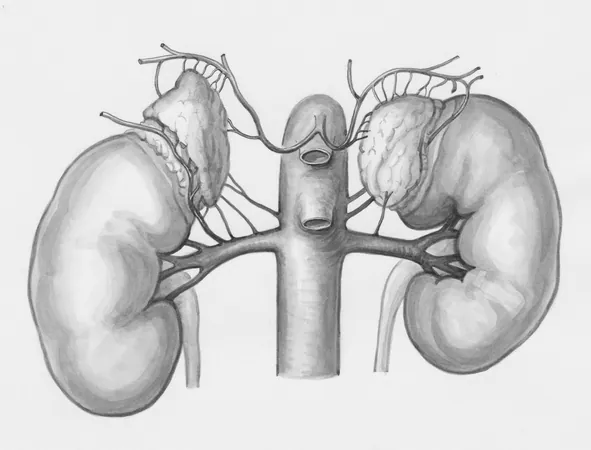
Unmasking the Silent Killer: Early Detection of Chronic Kidney Disease Can Save Millions!
2025-03-31
Author: Amelia
Chronic kidney disease (CKD) is stealthily affecting around 35.5 million people in the United States, yet only about half of those suffering from the condition are aware of it. This underdiagnosis can have dire consequences, as the progression of kidney disease can lead to life-altering complications and a drastic decline in quality of life.
Why Your Kidneys Matter—And What Happens When They Fail
The primary function of your kidneys is a dirty job: filtering waste products from your blood and eliminating them via urine. Healthy kidneys maintain a delicate balance of blood pressure, electrolytes, and can even stimulate red blood cell production.
However, they are not invincible. Over time, various factors like severe dehydration, chronic high blood pressure, or prolonged high blood sugar can cause irreversible damage to kidney function. In the worst-case scenario, this can lead to complete kidney failure, where the kidneys can no longer produce urine, resulting in dangerous levels of toxins and fluids in the body. Kidney transplant remains the gold standard for treatment, but many patients find themselves on the waiting list for years. In the meantime, dialysis becomes the only option, replicating the kidneys' filtering function but imposing significant lifestyle burdens and health risks.
The Insidious Risk Factors Behind CKD
High blood pressure and diabetes are the primary culprits behind chronic kidney disease in the U.S., with alarming statistics revealing that nearly 40% of diabetics and 30% of those with hypertension will also develop CKD. Unfortunately, early-stage kidney disease rarely presents noticeable symptoms, rendering many individuals unaware of their condition until it's too late. Regular monitoring, particularly for those with risk factors, is essential for early detection and prevention of worsening kidney function.
Interventions like SGLT2 inhibitors—medications initially designed for diabetes—have shown promise not only in managing blood sugar but also in providing direct protection to the kidneys. Nevertheless, early treatment relies heavily on accurate diagnosis, which too often slips through the cracks of healthcare systems.
Breaking Barriers to Early Detection
The grave underreporting of chronic kidney disease is a pressing issue. Up to one-third of patients approaching kidney failure have no prior recorded discussion about their kidney health, and less than 10% of those diagnosed even realize they have the disease. Various factors contribute to this oversight, including time constraints during healthcare visits and the prioritization of more apparent health issues.
Certain demographics—specifically nonwhite individuals, women, and those with lower socioeconomic status—are disproportionately affected by these gaps in care. Research reveals that patients are keenly interested in understanding their kidney health, yet many leave consultations feeling uninformed and neglected.
As kidney disease progresses, patients eventually receive care from nephrologists, who provide specialized treatments yet often too late to reverse damage done.
Empowering Patients to Combat CKD
Individuals at risk for CKD or those diagnosed with early-stage disease can take proactive steps to safeguard their kidney health. Engagement in conversations with healthcare providers is crucial. Patients should feel empowered to ask questions such as: "What is my risk for chronic kidney disease?", "Have I been tested?", and "What should my treatment plan be?"
Innovations are on the horizon to support these discussions, with researchers developing digital tools that visually convey a patient's risk and kidney function metrics. Studies confirm that those with a formal diagnosis typically receive care aligned with best practices and experience reduced disease progression.
Moreover, witnessing the struggles of loved ones undergoing dialysis can incite a strong desire in patients to actively manage their conditions. The motivation to prevent potentially severe outcomes—like kidney failure—can drive patients toward healthier lifestyles, including balanced diets, regular exercise, and adhering to medication regimens.
The Bottom Line: Early Awareness is Key!
Don’t let chronic kidney disease catch you off guard! Early detection and intervention can significantly alter the trajectory of kidney health, and awareness is the first step. Make your kidney health a priority—talk to your doctor today!









 Brasil (PT)
Brasil (PT)
 Canada (EN)
Canada (EN)
 Chile (ES)
Chile (ES)
 Česko (CS)
Česko (CS)
 대한민국 (KO)
대한민국 (KO)
 España (ES)
España (ES)
 France (FR)
France (FR)
 Hong Kong (EN)
Hong Kong (EN)
 Italia (IT)
Italia (IT)
 日本 (JA)
日本 (JA)
 Magyarország (HU)
Magyarország (HU)
 Norge (NO)
Norge (NO)
 Polska (PL)
Polska (PL)
 Schweiz (DE)
Schweiz (DE)
 Singapore (EN)
Singapore (EN)
 Sverige (SV)
Sverige (SV)
 Suomi (FI)
Suomi (FI)
 Türkiye (TR)
Türkiye (TR)
 الإمارات العربية المتحدة (AR)
الإمارات العربية المتحدة (AR)